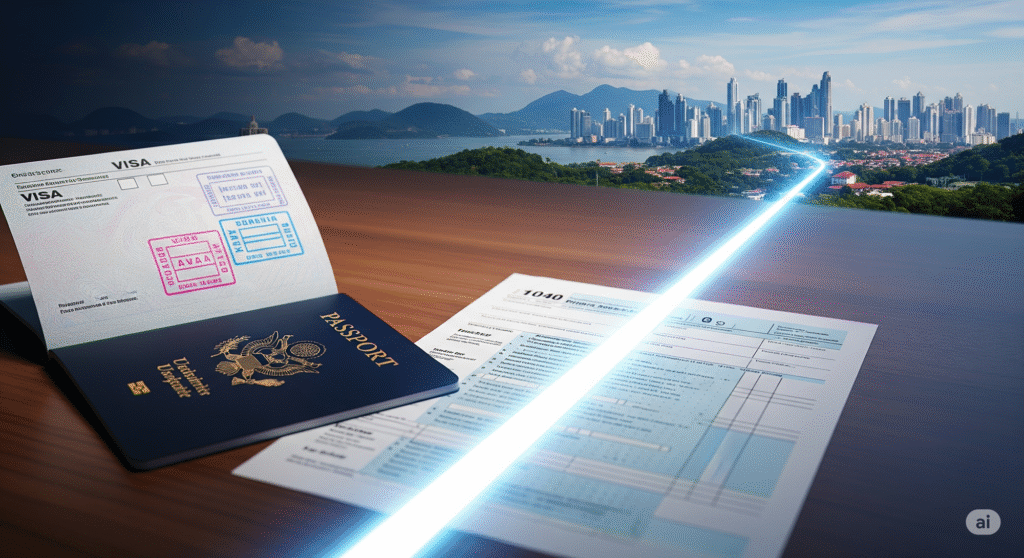
Introduction: Why US Expats in Panama Need to Pay Attention
Living in Panama offers incredible lifestyle benefits—affordable healthcare, a territorial tax system, and a vibrant expat community. But for US citizens, there’s one responsibility that never goes away: the obligation to file taxes with the IRS. Many expats in Panama discover this requirement late, often after years of not filing. The fear of penalties and back taxes can feel overwhelming—until they learn about the IRS Streamlined Foreign Offshore Procedures.
This program has become a lifeline for Americans abroad, providing a way to get back into compliance with the IRS without facing devastating penalties. For US expats in Panama, understanding how it works could mean the difference between financial stress and peace of mind.
What Are the IRS Streamlined Foreign Offshore Procedures?
The Streamlined Foreign Offshore Procedures are a special IRS program designed for US taxpayers living outside the country who failed to meet their tax and reporting obligations.
The program recognizes that many expats didn’t file their taxes not out of intent to deceive, but simply because they were unaware of the requirement. To qualify, you must certify that your failure to file was “non-willful”.
Here’s what the program requires:
- Three years of tax returns: You’ll need to file (or amend) the last three years of federal tax returns.
- Six years of FBARs: You must report foreign bank accounts by filing the Foreign Bank Account Report (FBAR) for the last six years.
- Certification of non-willfulness: A signed statement confirming your failure to comply was not intentional.
Unlike other amnesty programs, the Streamlined Procedures waive all penalties, provided you qualify. You only pay the tax owed (if any), plus interest.
Why This Program Matters for Expats in Panama
Panama’s territorial tax system often creates confusion. Many expats assume that because their income is generated outside of Panama, they don’t need to file anything at all. That’s true locally—but not for the IRS.
Even if you’re fully compliant with Panama’s tax rules, the IRS still requires you to file annually if your worldwide income exceeds the filing thresholds. For expats in Panama working remotely, living on pensions, or managing foreign investments, this is where the Streamlined Procedures can make all the difference.
Expat Experiences with the Streamlined Procedures
Many expats who chose this program describe a powerful emotional journey—one that starts with fear and ends with relief.
The Fear of the Unknown
The majority of expats who opt for the Streamlined Procedures do so after living for years with the anxiety of not being compliant. Some only discovered their IRS obligations by chance, often through conversations with other expats or financial advisors. The first reaction is usually panic. Stories of massive penalties for failing to file returns or FBARs are enough to keep anyone awake at night.
The Streamlined Program as a Lifeline
The relief comes when they learn about the IRS Streamlined Foreign Offshore Procedures. Many expats describe it as an “amnesty” or a “safe exit” offered by the IRS. It feels like a lifeline—an opportunity to correct years of mistakes without facing crushing penalties. For many, this was the turning point that allowed them to finally address their tax situation head-on.
Why You Shouldn’t Do It Alone
Across all testimonies, there’s one consistent piece of advice: do not attempt this process by yourself. Expats share that working with a qualified tax attorney or CPA who specializes in expat taxes is essential. The paperwork is complex, and making errors could draw the very scrutiny you’re trying to avoid.
The Key Factor: Non-Willfulness
To qualify, expats must prove their non-willfulness—that they genuinely didn’t know about their IRS obligations. For most, this is true. They never intended to hide income or evade taxes. The requirement is to file three years of back taxes and six years of FBARs, alongside the certification of non-willfulness.
Peace of Mind at Last
The result? Almost every expat who has gone through the program describes the same feeling: peace of mind. The process can be lengthy, and hiring a professional has a cost, but the reward is enormous. No more sleepless nights, no more fear of IRS letters, and the assurance that they are fully compliant.
In the words of one expat:
“It felt like moving from fear to freedom. Yes, it took time and money, but the peace of mind was worth every cent.”
Practical Considerations for Expats in Panama
- Hire a professional: CPAs and tax attorneys specializing in expat taxes are invaluable.
- Expect a timeline: The process can take months, depending on your case and IRS backlogs.
- Budget for costs: While the IRS waives penalties, professional services are not cheap. Still, most expats consider them a necessary investment.
- Remember your Panama obligations: Even though Panama only taxes local income, you may still need to maintain compliance with their rules if you have a business or work locally.
Final Thoughts
The IRS Streamlined Foreign Offshore Procedures are not just a technical tax program—they are a pathway to peace of mind for US expats in Panama. If you’ve been living abroad unaware of your IRS obligations, this program offers a chance to correct your course without facing penalties that could devastate your finances.
Disclaimer: This article is for informational purposes only and does not constitute legal or tax advice. Always consult with a qualified CPA or tax attorney to evaluate your situation before taking action.
7 FAQ: IRS Streamlined Foreign Offshore Procedures for Expats in Panama
1. Do I still need to file US taxes if I live in Panama?
Yes. As a US citizen or Green Card holder, you are required to file US taxes no matter where you live. Even if Panama does not tax your foreign income, the IRS still expects you to report your worldwide income every year.
2. What is the IRS Streamlined Foreign Offshore Procedures program?
It’s a special IRS program that allows US taxpayers abroad to catch up on past-due tax returns and FBARs without facing heavy penalties. To qualify, you must certify that your failure to file was non-willful (unintentional).
3. Who qualifies for the Streamlined Procedures?
You may qualify if:
a. You lived outside the US for at least 330 days in one of the last three years.
b. You failed to file US tax returns or FBARs due to non-willfulness.
c. You are willing to file three years of tax returns and six years of FBARs, along with a signed statement of non-willfulness.
4. What documents do I need to submit?
a. Three years of back US tax returns (or amended returns).
b. Six years of FBARs (Foreign Bank Account Reports).
c. A signed Certification of Non-Willfulness.
d. Supporting financial documents such as bank statements, W-2s, 1099s, or income proof.
5. How much does it cost to use the Streamlined Procedures?
The IRS does not charge a penalty for qualifying taxpayers. However, you should expect to pay for the services of a CPA or tax attorney. Fees vary depending on the complexity of your case, but expats often report costs ranging from $1,500 to $5,000.
6. How long does the process take?
The entire process can take several months, depending on the IRS backlog and the complexity of your filings. On average, many expats see resolution in 6–12 months.
7. What if I don’t qualify for the Streamlined Procedures?
If the IRS determines your failure was willful, you may need to consider other disclosure programs or legal strategies. This is why consulting a qualified expat tax professional is essential before submitting anything.
